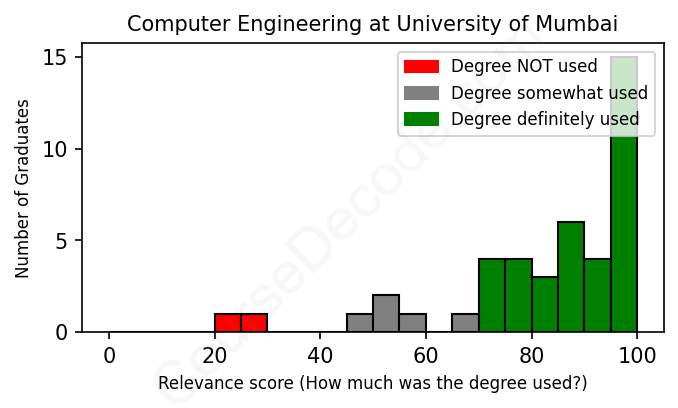
First, some facts. Of the Computer Engineering graduates from University of Mumbai we've analyzed , here's how many have used (or NOT used) their degree in their career:

These are estimates based on AI analysis of 43 LinkedIn profiles (see below).
The verdict? Significantly above average. Overall, with an average relevance score of 82%, Computer Engineering graduates from University of Mumbai have a much higher likelihood (+15%) of finding work in this field compared to the average graduate across all fields:
And for comparison, here's the chart for all profiles we've looked at across all degrees.
Also, after graduating, 86% of these graduates have pursued further education other than another Bachelor's degree (such as a Masters degree or other), compared to the average across all profiles of 35%. This suggests you may need more than just a Bachelors degree to be competitive as a Computer Engineering graduate.
See the details:
|
Relevance score: 89% We think this person has gone into a career highly relevant to their degree. We think this person has gone into a career highly relevant to their degree.
DEGREE INFOGraduated in 2011 from University of Mumbai with a Bachelor's degree in Computer Engineering. Also pursued further education since (see below). JOB HISTORY SINCE GRADUATIONSenior Security Analyst Tech Mahindra Feb 2012 - Jun 2015 Sr.Security analyst  Tech Mahindra Feb 2012 - Jul 2015 Cyber Risk Advisory Intern  Deloitte Jun 2016 - Aug 2016 Cyber Risk Strategy Manager  Deloitte Mar 2017 - Sep 2021 Product/Partner Success Manager  Saviynt Oct 2021 - Present FURTHER DEGREES DONE SINCE GRADUATINGMS Managemet Information SystemsUniversity of Illinois Chicago 2015 - 2016 ABOUT[NAME REMOVED] Dedhia is an experienced cyber security consultant, having worked globally in Europe, U.S.A & Asia. His current experience is in developing tailored Cyber Security Framework for financial clients based on ISO/NIST/NYDFS and performing Cyber Security Risk & Control Assessments and generating risk reports. He also has experience implementing Identity & Access Management(Oracle,CA)/Privilege Identity Management(CyberArk) solutions. |
The top 10 most common jobs done by the graduates we've analyzed (ranked most common to least) are:
After diving into the career paths of Computer Engineering graduates from the University of Mumbai, it's pretty clear that a significant number of them end up in roles like Software Engineers, Application Developers, and Data Scientists. These positions typically involve direct application of programming, software development, and system design skills—capabilities that are foundational to what they learned during their studies. For example, many have worked as Software Developers at well-known companies like Amazon, eBay, and Tata Consultancy Services, where they actively engage in building and optimizing software systems, making their work highly relevant to their degree.
However, not all jobs related to tech are directly about coding or engineering per se. Some roles, like those in Quality Assurance or even Project Management, while still requiring a tech-savvy mindset, might not fully utilize the core Computer Engineering knowledge. They often lean more on interpersonal skills or basic programming understanding. It's fascinating to see how diverse the job outcomes can be, ranging from high relevance in software development to roles that tap into tech indirectly, like business analysis or user experience design. Overall, it seems that most graduates are leveraging their Computer Engineering background effectively, with many thriving in jobs that showcase their skills and knowledge directly.
Here is a visual representation of the most common words in job titles for Computer Engineering graduates (this is across all Computer Engineering graduates we've analyzed, not just those who went to University of Mumbai):

Graduates from the University of Mumbai with a degree in Computer Engineering have generally taken quite promising paths after finishing their studies. For many, their first jobs involve roles like Software Engineer, Systems Engineer, or Application Developer, often at well-known companies like Infosys, Capgemini, or Tata Consultancy Services. This trend indicates that these graduates tend to land solid entry-level positions that are relevant to their field, which is a great sign that their education is well-aligned with industry demands. Over the years, we see a significant progression in their careers, with many moving up to senior roles such as Senior Software Engineer, Project Manager, or even Consultant positions at major firms like Amazon, JPMorgan Chase, and eBay. This steady advancement demonstrates a healthy career trajectory and a strong alignment with tech industry growth.
As time goes on—five to ten years post-graduation—many graduates continue to thrive and shift into more specialized or leadership roles. Those initial positions often help them build a strong skill set that they leverage to climb the corporate ladder, often transitioning into roles related to Cloud Computing, Data Science, or Cybersecurity. There are also quite a few who get into academic or consulting fields, showing the versatility of a Computer Engineering background. On the other hand, there are a few individuals who veer off into roles unrelated to their degree, like quality assurance or various IT support roles, but they tend to be the exception rather than the rule. Overall, it appears that most graduates leverage their degree effectively, leading to successful and relevant careers in the tech industry. It’s definitely an encouraging landscape for anyone considering a degree in Computer Engineering!
So, getting a Bachelor’s degree in Computer Engineering, whether it's at the University of Mumbai or elsewhere, can be pretty challenging but also rewarding. You’ll dive into a lot of complex subjects like programming, circuits, and algorithms, and there’s a fair amount of math involved, which can be a bit tricky if you're not a fan of numbers. The workload can be intense, with projects and exams piling up, but if you have a genuine interest in tech and enjoy problem-solving, it can definitely be manageable. It’s not the easiest degree out there, but with good time management and a supportive study group, many students get through it just fine!
Most commonly, in the LinkedIn profiles we've looked at, it takes people 4 years to finish a Bachelor degree in Computer Engineering.
Looking at the career paths of these Computer Engineering graduates from the University of Mumbai, it seems like many have done pretty well financially, especially those who climbed up the corporate ladder or landed jobs at major companies like Amazon, JPMorgan, and Capgemini. The folks who started off as software engineers or consultants generally moved into more advanced roles, which typically means their salaries increased over time. For instance, people who have moved from positions like Junior Developer to Senior Software Engineer are likely earning quite a decent paycheck now. While entry-level jobs might not have paid that much initially, the progression into senior roles suggests they’ve seen their income grow significantly. That being said, not everyone follows this high-earning trajectory, especially those still in the earlier stages of their careers or who are interning. Overall, it sounds like they're on a good path to making some solid money, especially as they continue to gain experience.
Here is a visual representation of the most common words seen in the "about" section of LinkedIn profiles who have a Bachelor degree in Computer Engineering (this is across all Computer Engineering graduates we've analyzed, not just those who went to University of Mumbai). This may or may not be useful:

Here are all colleges offering a Bachelor degree in Computer Engineering (ordered by the average relevance score of their Computer Engineering graduates, best to worst) where we have analyzed at least 10 of their graduates:
| College | Score | Count |
|---|---|---|
 University of Florida University of Florida
|
95 | 18 |
 Michigan State University Michigan State University
|
94 | 10 |
 Brigham Young University Brigham Young University
|
94 | 10 |
 Penn State University Penn State University
|
92 | 14 |
 California Polytechnic State University-San Luis Obispo California Polytechnic State University-San Luis Obispo
|
91 | 14 |
 University of Central Florida University of Central Florida
|
90 | 14 |
 Georgia Institute of Technology Georgia Institute of Technology
|
90 | 14 |
 Purdue University Purdue University
|
86 | 34 |
 University of Illinois at Urbana-Champaign University of Illinois at Urbana-Champaign
|
86 | 30 |
 Iowa State University Iowa State University
|
86 | 25 |
 Texas A&M University Texas A&M University
|
85 | 17 |
 San Jose State University San Jose State University
|
85 | 16 |
 Clemson University Clemson University
|
85 | 14 |
 Dwarkadas J. Sanghvi College of Engineering Dwarkadas J. Sanghvi College of Engineering
|
85 | 10 |
 North Dakota State University North Dakota State University
|
84 | 12 |
 Savitribai Phule Pune University Savitribai Phule Pune University
|
83 | 25 |
 University of Mumbai University of Mumbai
|
82 | 43 |
 New Jersey Institute of Technology New Jersey Institute of Technology
|
81 | 11 |
 University of North Carolina at Charlotte University of North Carolina at Charlotte
|
79 | 11 |
 California State Polytechnic University-Pomona California State Polytechnic University-Pomona
|
76 | 11 |
 The University of Texas at Dallas The University of Texas at Dallas
|
76 | 18 |
 University of South Florida University of South Florida
|
69 | 10 |
 Gujarat Technological University, Ahmedbabd Gujarat Technological University, Ahmedbabd
|
55 | 13 |